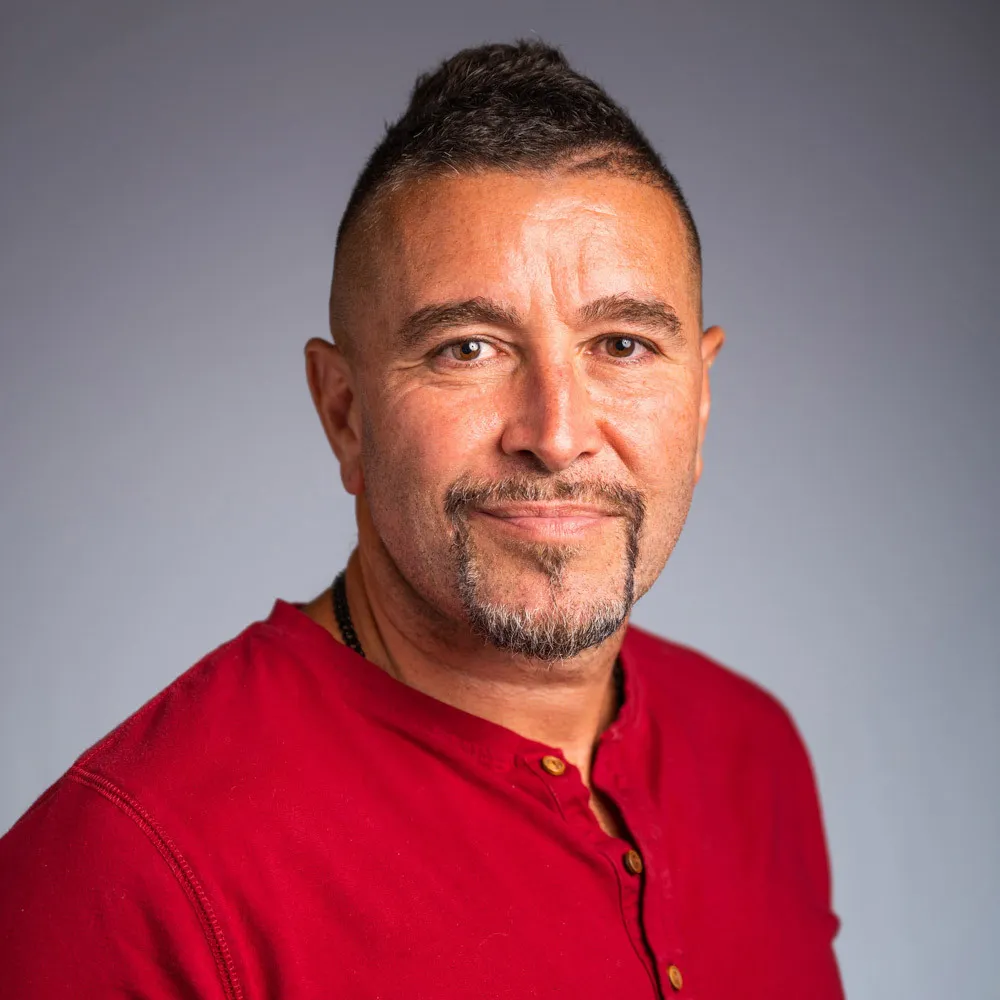- November 20, 2023
- By Audrey Bartholomew ’23
José Magro talks with his Spanish students at the University of Maryland about language and power, sprinkling his lectures with snippets of hip-hop.
Three decades ago, mic in hand in Madrid clubs, he did the reverse, injecting his hip-hop with antiracist and anti-fascist political messages as part of one of Spain’s most influential rap groups.
Magro has maintained his hip-hop career even as the assistant clinical professor built a reputation in academia as an expert on incorporating antiracism into the teaching of the Spanish language in U.S. classrooms. And as Americans gather on Thanksgiving to celebrate a holiday rooted in the experience of British colonists, Magro will return to the stage in Chile. He’ll reunite with his five bandmates in El Club de los Poetas Violentos (The Violent Poets Society, later shortened to CPV) at Teatro Coliseo in Santiago, for the 25th anniversary of their trailblazing Spanish hip-hop album “Grandes Planes” (Big Plans). Presale tickets have sold out.

Magro grew up in Alcorcón, Spain, just southwest of Madrid, a town that became the hotbed for Spanish rap, by and large due to the influence of a nearby party-centric American military base in Torrejón.
His journey began at a rap-battle party in 1992, where he watched his future bandmates perform. Two weeks later on a flight to New York, he met one of them, an MC named Rachid “Kamikaze” Baggasse, who suggested Magro meet his other bandmate in Madrid, José María “Supernafamacho” Nafría. CPV was born shortly thereafter, and its music aggressively critiqued the recently formed democratic government in Spain that included members of the regime of the late dictator Francisco Franco, who ruled Spain from 1939 to 1975.
“[Hip-hop] was our tool to communicate and express our frustration, especially in a country with youth unemployment over 50%,” said Magro, who adopted the stage name El Meswy. “We were living under mostly the same regime with the appearance of being in a democracy.”
In 1994 the group released its debut LP, “Madrid Zona Bruta,” one of the first of its kind in Spain. Its rowdy, rebellious music was an activating force for the communities that El Meswy, Frank-T, Kamikaze, Paco King, Supernafamacho and Mr. Rango grew up in, drawing from American rap styles to put their struggles into the art form that was taking off all over the country. CPV songs like “Sánchez” challenged the heavy police presence in Spain at the time, “Neither the police nor the infantry can remove me—well, I have Godzilla puree for breakfast,” rapped Supernafamacho.
Following the release of CPV’s third album, “Grandes Planes,” the magazine Mondo Sonoro described it as a departure from its often angry, aggressive attacks on the social order of Spain.
“Their albums, until now, reflected an almost constant annoyance with everything around them. With power, with the musical world, with priests, with the police,” it read. “They seem more fun now and we’d like to think it’s because they take themselves less seriously.”
CPV became the first Spanish hip-hop group to produce an album at the famed D&D Studios in New York, which boasted talent like Jay-Z, Biggie Smalls, Foxy Brown and Nas.
“For us as youngsters, we would see who we were listening to—to us they were superstars…we saw Jeru the Damaja, and of course, Killarmy was there mixing the album and we did one track with Dom Pacino,” recalled Baggasse.
Despite “Grandes Planes’” status as the most-sold Spanish hip-hop album in 1998, the group members were still hustling other jobs to make ends meet and soon went on hiatus. “We were never meant to be a group, but rather a collective of artists, a club of poets—we became a group by accident,” Magro said.
Each member put out his own solo projects. Magro extended his linguistic flair and theme of antiracism into his own music that reflect his own experiences, including his debut album “Tesis Doctoral” and “Tesis Postdoctoral,” released 20 years later. His last full-length project was released in 2022.
“Belonging to the hip-hop community has always been very closely linked to being a linguist … that experience helped a lot with understanding language, how language works, and how language is performed,” said Magro.
Magro’s past as a performer informs the way he thinks, writes and teaches. After receiving his bachelor’s in 1995 with the Universidad Complutense de Madrid, he moved in 1999 to Brooklyn, where he earned his master’s in Spanish education and doctoral degrees in Hispanic linguistics. He became involved with the KIPS Bay Boys & Girls Club in the Bronx in 2009, developing a program teaching critical thinking to at-risk youth via hip-hop, serving as the inspiration to take up education full-time.
A few months after completing his Ph.D. in 2016, he arrived at UMD, where he infuses his classes with a variety of Spanish hip-hop lyrics for insights into the cultures and struggles of Latino and Hispanic countries worldwide.
“Those communities that are underrepresented, they have a voice through hip-hop,” he said. “It’s a very useful tool.”
In addition to his Spanish and linguistics classes, Magro works as an independent antiracist consultant on and off campus. In May, he released his first book, “Language and Antiracism: An Antiracist Approach to Teaching (Spanish).
Topics
People